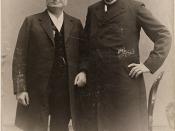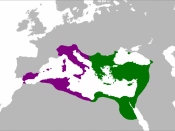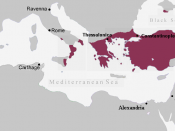Russia 1450-1750Western civilization changed significantly between 1450 and 1750. While Russia remained an agricultural society, the West became very commercially active and developed a strong manufacturing base. Many of the core areas of the West transformed; governments increased their powers, science became the focus of intellectual life. These changes resulted from overseas expansion. Russia, on the other hand, was heavily concerned with territorial expansion, eventually becoming the chief power of Eastern Europe. From there, Russian tsars began a course of selective Westernization which, despite imitating the West, kept them mostly outside the global trade system.
Russia's early days had been shaped by the Byzantine Empire. When the Byzantine's power faded, so did that of the early Russian Tzars. Before Peter the Great's rule, Russians had had almost no contact with Europe. The feudalistic political and economic structure meant that tsars had trouble containing the boars, or Russian nobility, who often plotted against them.
Partly because of this threat, the Tzars practiced absolutism, with the power of the Tzar backed by divine right granted by the Russian Orthodox Church.
Peter the Great's reign became the turning point for Russia. Peter's Russia was an enormous, cold empire with almost no transportation; no navy, a limited army, very few decent roads, and few warm water ports. Peter hoped to strengthen his country by westernizing it. After a long visit to England and Holland, he returned to Russia convinced that the empire could only become powerful by imitating western successes. The way he would do this was through military reform, reorganization of the bureaucracy, and relocation of the capital.
After the death of Peter in 1724, Russian territorial expansion continued. Catherine the Great took power. She was similar to Peter in a lot of her beliefs, such as her feelings toward Westward expansion.


